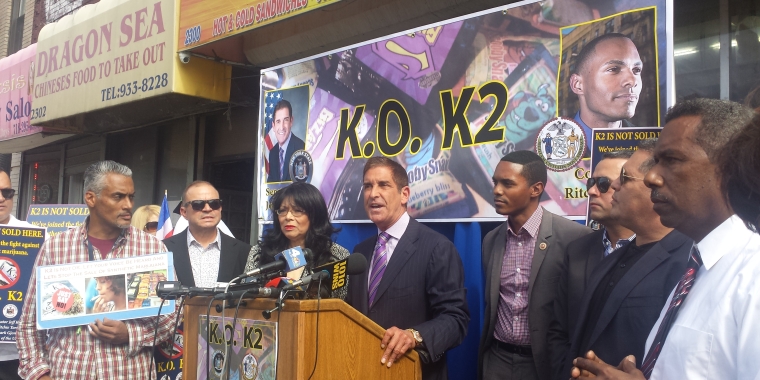
Senators Klein, Espaillat & Peralta balance NYCHA application process for homeless domestic violence victims
Jeffrey D. Klein
May 28, 2015
Senate passes bill granting homeless domestic violence victims the same preference status as granted to homeless New Yorkers
Albany, NY— State Senator Jeff Klein (D-Bronx/Westchester) today passed legislation creating equal priority for homeless domestic violence victims and their children applying for apartments in the New York City Housing Authority. Shockingly, homeless victims of abuse classify as second priority, while homeless New Yorkers rank first priority.
“NYCHA’s tale of two priorities for homeless New Yorkers is tragic for the women and children who have suffered through abuse. It is devastating to these families to learn that seeking a roof, a place to feel safe and independent from abusers, results in long waiting times even though they are homeless too. Today we send a message that homeless domestic violence victims deserve the same priority status as other homeless applicants. Anything other is an injustice,” said Senator Klein.
The bill, S.4558A, co-sponsored by Senators Adriano Espaillat (D-Manhattan-Bronx) and Jose R. Peralta (D-Queens) address disparities in the priority rankings for domestic violence victims first unveiled in a December 2014 investigative report by the Independent Democratic Conference.
In order to determine eligibility for public housing, NYCHA currently adopts a dual preference system that divides applicants into two categories including, “Working Family” and “Need based.” Under the “Working Family” preference, homeless New Yorkers are assigned a priority based on a number of factors including family size and gross income. The “Need based” criteria ranks applicants from “N-0” to “N-8” based on qualifying circumstance. Under this preference, homeless families referred to NYCHA by the New York City Department of Homeless Services (DHS) have “N-0” priority while victims of domestic violence qualify for “N-1,” or second priority.
NYCHA considers applicants who are homeless for one year first priority. Even though applicants who are homeless domestic violence survivors for one year, the same amount of time as a homeless applicant who resided in a DHS shelter for one year, victims go through the HRA shelter system and are forced out after six months. These victims seek shelter in privately-run facilities for the following six months in order to receive the essential protections they need to survive. Time spent in a privately run shelter does not count on the application.
“No matter what shelter someone chooses to seek refuge from an abusive relationship, they deserve priority consideration for public housing. This common sense legislation will give homeless domestic violence survivors the same consideration on NYCHA’s waitlist for an apartment, regardless of whether they stay in a shelter run by a non-profit or the City,” said Senator Espaillat.
“I am a proud to be a cosponsor of this important legislation that recognizes the importance of housing in breaking the cycle of domestic violence,” said Senator Peralta. “For a domestic violence survivor to flee an abusive relationship, it is essential that the economic and social means to do so are available to support such an effort. This bill takes a large step forward in furthering this goal by leveraging the scale of the City of New York’s public housing system.”
“Access to public housing enables survivors of domestic abuse to start new lives free of violence. This legislation will ensure that those courageous families who leave their abusers and seek refuge in our shelters are granted the same priority for housing as other homeless households,” said New York City Councilmember Ritchie Torres, Chair of the Committee on Public Housing. “I commend Senator Klein who has been a fearless champion on behalf of domestic violence survivors for spearheading this critical issue in the Senate.”
Domestic violence awareness groups and homeless housing providers praised the bill’s passage.
“We fully support S.4558A which provides equality for all families who are homeless in accessing public housing. For over 28 years we have advocated for equality in treatment for all homeless families. Whether impacted by domestic violence or other barriers to stability, all eligible families deserve equal access to public housing,” said Michael J. Callaghan, executive director of the Thorpe Family Residence and Nazareth Housing.
“All homeless families – no matter what shelter system they use – should have access to the city referred homeless priority for public housing. Homeless domestic violence survivors should not be given a lower priority simply because they chose to seek refuge in a shelter system specifically designed to meet their safety and service needs,” said Carol Corden, executive director of New Destiny.
“The Voices of Women Organizing Project supports the efforts of Senator Klein, Assemblyman Luis Sepúlveda and Council Member Torres to ensure that domestic violence victims and their children have an equal opportunity to attain shelter and live free from violence. Survivors of domestic violence applaud their efforts and encourage all to support the passage this bill,” said Raquel Singh, executive director of the Voices of the Women’s Organizing Project.
“This proposed legislation is a concrete step towards ending the current practice of excluding HRA DV Shelter residents from NYCHA’s N-0 priority. If adopted, this legislation will help to ensure that all homeless persons have meaningful access to housing and that all survivors of abuse have a reasonable chance to attain a pathway to permanent housing and the safety it provides Today, we are elated to find that our voices have been heard, and we are thankful for Council Member Richie Torres’ advocacy efforts, and Senator Klein’s proposed legislation,” said Erin Feely-Nahem, executive director of Food First.
Share this Article or Press Release
Newsroom
Go to Newsroom
Senator Klein to NFL: Tackle K2 Use
February 5, 2016

KLEIN PASSES BILL BANNING VIOLENT SEX OFFENDERS FROM FAMILY SHELTERS
February 1, 2016